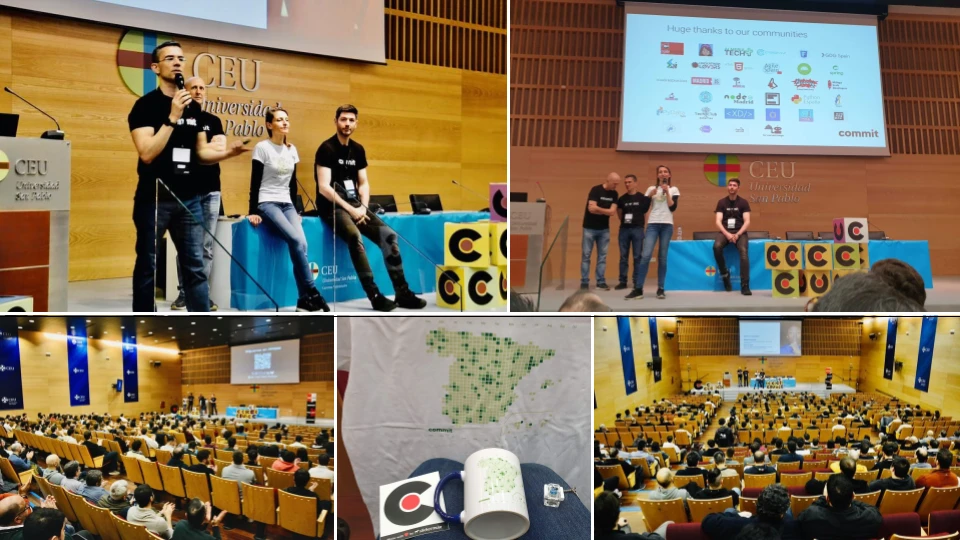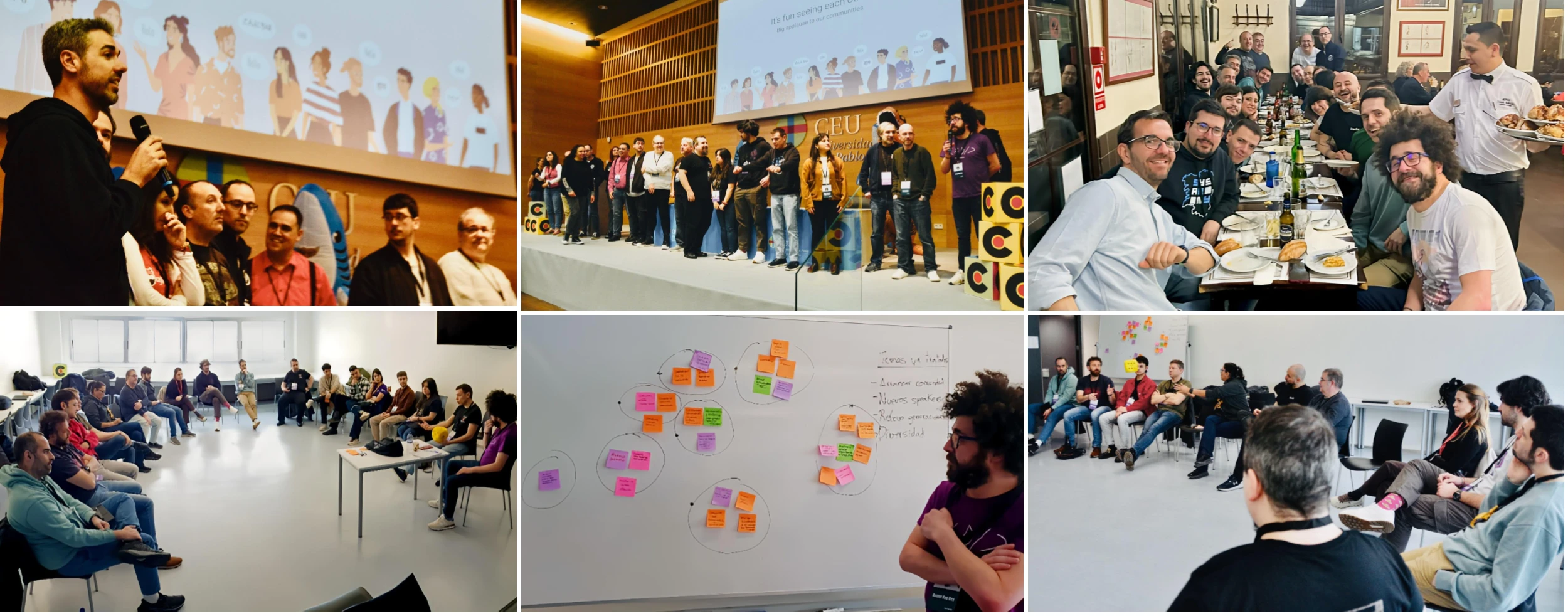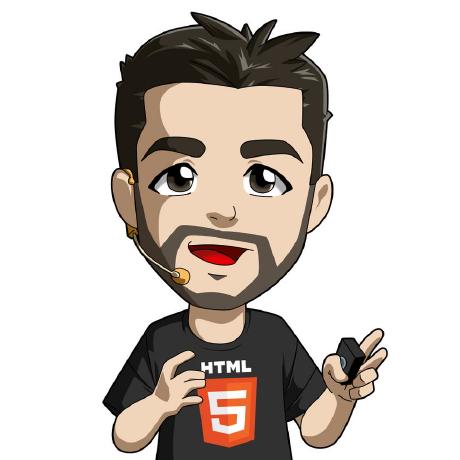A couple of months ago, I attended Commit Conf, one of my favorite conferences in Spain (and I never get tired of saying it).
Around 1,000 of us gathered (including 80 speakers) to talk about:
- Development (e.g., programming languages, databases, web & mobile development)
- User Experience design (e.g., UX/UI design, accessibility)
- Development practices (e.g., Agile and Lean methodologies, DevOps practices)
- Artificial Intelligence and data science (e.g., machine learning, LLMs, data science)
- Infrastructure (e.g., cloud computing, IoT)
- Information security and privacy (e.g., cybersecurity, data protection)
- And much more (e.g., power skills, blockchain, etc.).

As expected... I loved the SWAG this year, the design was A MAP created with GitHub Commit contributions! (Amazing work 😍):

Once again, dozens of tech communities joined forces to help promote the event and select talks. In our case, through the Geo Developers community.
In this post, I want to highlight three main things:
- Our talk about map APIs.
- Reconnecting with tech communities.
- And what I learned from the talks and hallway chats.
The Billion Dollar Code 🤑
We named our talk after the Netflix miniseries (which we also used as a storytelling thread). Although my talk titles are usually more descriptive, this one had the intended effect — we exceeded my expectations for attendance, and apparently those of the organizers too, because the room was packed.
Juanma and I counted around 70 people:

As stated in the abstract, this talk focused on the technical challenges and complexities of implementing map services at a global scale.
Our goals were:
Spark interest in the topic: Show some lesser-known but fascinating aspects of these services.
Highlight technical complexity: Reveal just how intricate these technologies are, and the level of software and data engineering required.
Value continuous effort: Emphasize the ongoing work involved in maintaining, improving, and innovating within map APIs, and hint at what’s coming next.
Help people make better tech decisions: Raise awareness of the variety of providers out there and improve the ability to choose the right mapping tech for future projects.
I usually don’t co-present, but after this experience, I think I should do it more often.
This time I really wanted it to be Juanma and me. Not just because we’ve had a great relationship for years, but also because we work at two of the most established companies in the industry (with over 100 years of combined experience). Plus, we complement each other really well — we cover the challenges from both a software and data perspective, not just for creating, but especially for keeping these services up to date.
The feedback we received both via the platform and in the hallways was excellent. In short:
What worked well:
People loved the content and many said it surprised them.
Several folks mentioned they had never stopped to consider the technical complexity behind these services.
Visual examples were especially appreciated — they helped people understand the concepts and challenges better.
Areas for improvement:
Consider the timing (it was the last talk of the day) and adjust pacing and depth accordingly.
Break the session into multiple parts next time to go into more detail.
Quite a few people told us they were feeling tired as it was the final talk of the day. Even so, the response was very positive (we scored 4.5 out of 5), despite the very fast pace (around 33 seconds per slide on average 😅).
You can find the presentation here (in Spanish):
And the recording is available on Commit Conf’s YouTube channel (also in Spanish, but you can activate English subtitles 🤷):
Reconnecting with Communities
Another reason I love Commit is that it brings together a lot of us who organize and run tech communities.
For the third year in a row, the organizers accepted our Open Spaces proposal, which is always a great opportunity to meet new people and learn from their experiences.
Note: In case you didn’t know, the “meta-community” we launched last year — Community Builders — was born from the idea of keeping these kinds of conversations going after events like this. 😍

We even recorded audio from the open space session, and shared the materials and notes here (again, everything is in Spanish 😅).
At the closing session, I was invited onstage with the other communities to introduce each one. I took the chance to briefly explain what Community Builders is.
To wrap up, we had a post-conference dinner at Casa Mingo, where Álvaro and I brought together around 20 people who help run communities (including some who couldn’t attend the conference). A perfect way to end the event.
No doubt about it — these activities help us connect on a human level, something much harder to achieve remotely. Bonds are formed, relationships are strengthened, and there's a real sense of closeness that just doesn’t translate through video calls.
Lessons Learned About AI
No offense to the other topics (there were some excellent talks, many of which are now on YouTube), but this year’s big star was AI. Of the 70 sessions, 17 focused on it — so pretty much at any given time, you could find a talk on Machine Learning or LLMs.
Here’s a quick rundown of themes and the interest I observed:
Practical AI integration in real-world apps
People are eager to understand how to embed AI into existing apps using commercial or open-source models without switching tech stacks.Autonomous AI agent development
High curiosity around building agents that can learn and act on their own.Security and auditing in generative models (LLMs)
Rising concern over the risks of generative AI — from running unknown code to accidentally introducing vulnerabilities. There's growing demand for tools that provide auditing and control.Observability and performance (in production)
More and more interest in understanding LLM behavior in real time, with tools that offer metrics, logs, and traces to improve stability and performance.Advancements in RAG architectures (RAG 2.0)
Curiosity around new variants that improve contextual retrieval.AI on mobile devices
Moderate interest in running AI directly on phones without relying on the cloud.AI applications in real-world scenarios
Less buzz overall, but still some interest in learning about how AI is being used in everyday situations.
I also had a bunch of hallway conversations worth sharing:
AI is replacing traditional platforms like Stack Overflow, Reddit, and Google Search for developers — tools like GitHub Copilot, Cursor.ai, and Windsurf are seen as faster, more tailored, and more efficient.
- My takeaway: How will this affect traditional educational channels?
Vibe coding seems to be mostly well-received — as long as it's for small utilities, side projects, or low-risk tools (e.g., a command-line client for an API).
AI-assisted coding is becoming widespread (even among senior devs), often used for inspiration or to explore alternatives — though the code is always double-checked.
Some people pointed out how tempting it is to use AI with unfamiliar tech — the danger being that you may not catch mistakes or bad practices in the generated code.
Jon Vila shared a great insight: the risk of empowering less technical roles, like product managers, who start generating code with AI and then challenge development estimates.
AI is creeping into every phase of software development — from writing tests and documentation to generating test data and even creating pull requests.
People are really interested in tools like:
Final Thoughts
As long as I can, I’ll keep going to Commit — because to me, it’s one of those rare events where you learn, connect, and leave with a full dose of community spirit. It’s intense, sure, but it’s an event where:
- You learn a ton (in talks and in the hallways)
- You meet new people
- You reconnect with old friends
- And it’s a meeting point for tons of tech communities
Thanks, thanks, and a thousand thanks to Laura, Abraham, Nacho, Kini, and all the volunteers and sponsors who made this event possible once again.
If you’re still hungry for more, check out the piece I wrote last year: Why Attend Developer Conferences
